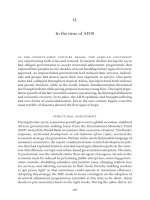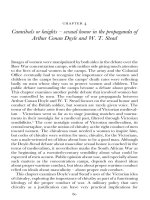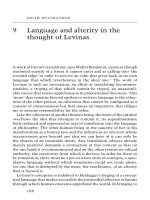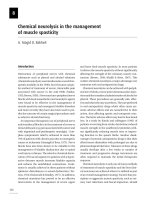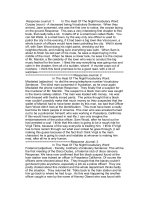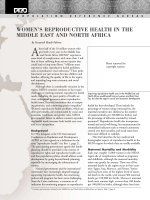philips sarah d. women's social activism in the new ukraine. development and the politics of differentiation. bloomington, 2008
Bạn đang xem bản rút gọn của tài liệu. Xem và tải ngay bản đầy đủ của tài liệu tại đây (2.43 MB, 233 trang )
d e v e l o p m e n t a n d t h e p o l it i cs o f
d i f fe re n t i a t i o n • s a r a h d . p h i l l i p s
WOMEN’S
SOCIAL ACTIVISM
IN THE NEW UKRAINE
WOMEN’S SOCIAL ACTIVISM IN THE NEW UKRAINE
p h i l l i p s
IND IANA
University Press
Bloomington & Indianapolis
1-800-842-6796
INDIANA
When the socialist regimes of Eastern Europe fell in the early
1990s, it was assumed that robust civil societies would be the key
to establishing democracy in the region. Western governments
allocated millions of dollars to civil society building efforts,
especially nongovernmental organizations. In postsocialist Ukraine,
with privatization and the scaling back of the social safety net, it is
primarily women who have been left as leaders of service-oriented
NGOs and mutual-aid associations, caring for the marginalized and
destitute with little or no support from the Ukrainian state. In this
compelling study, Sarah D. Phillips follows eleven activists over the
course of several years to document the unexpected effects that
social activism has produced for Ukraine’s women as they take
up the “housework of politics.” While NGO activism is generally
assumed to be empowering in such situations, Phillips reveals
the NGO sector to be a site for postsocialist “differentiation” of
citizens, as criteria for productive citizenship are reworked, and
the rights and needs of various categories of citizens redened.
By viewing the women’s experiences in the broader context of
social change, Ukrainian social welfare reform, and international
development programs, Phillips examines intertwining processes
of differentiation as certain types of claims, organizations, and
NGO leaders are privileged over others, sharpening social
inequalities.
s a r a h d . p h i l l i p s
is Assistant Professor of
Anthropology at Indiana University, Bloomington.
New Anthropologies of Europe
Daphne Berdahl, Matti Bunzl, and Michael Herzfeld,
founding editors
Cover illustration: Women at an AIDS awareness march in Kyiv.
Cover photo courtesy of UNIAN.
RUSSIA & EASTERN EUROPE
WOMEN’S STUDIES
ANTHROPOLOGY
Cover illustration:
Women at an AIDS
awareness march
in Kyiv. Cover photo
courtesy of UNIAN.
FPO even though
le is 300 dpi
Women’s Social Activism in the New Ukraine
New Anthropologies of Europe
Daphne Berdahl, Matti Bunzl, and Michael Herzfeld, founding editors
SARAH D. PHILLIPS
Women’s Social Activism
in the New Ukraine
Development and the Politics
of Differentiation
indiana university press
Bloomington and Indianapolis
This book is a publication of
Indiana University Press
601 North Morton Street
Bloomington, IN 47404-3797 USA
Telephone orders 800-842-6796
Fax orders 812-855-7931
Orders by e- mail
©2008 by Sarah D. Phillips
All rights reserved
No part of this book may be reproduced or utilized in any form or by any means, electronic or mechanical,
including photocopying and recording, or by any information storage and retrieval system, without permission
in writing from the publisher. The Association of American University Presses’ Resolution on Permissions
constitutes the only exception to this prohibition.
The paper used in this publication meets the minimum requirements of American National Standard for
Information Sciences— Permanence of Paper for Printed Library Materials, ANSI Z39.48-1984.
Manufactured in the United States of America
Library of Congress Cataloging- in- Publication Data
Phillips, Sarah D.
Women's social activism in the new Ukraine : development and the politics of differentiation / Sarah D.
Phillips.
p. cm. — (New anthropologies of Europe)
Includes bibliographical references and index.
ISBN 978-0-253-35164-7 (cloth : alk. paper) — ISBN 978-0-253-21992-3 (pbk. : alk. paper) 1. Women social
reformers— Ukraine. 2. Non- governmental organizations— Ukraine. 3. Ukraine— Social conditions—1991–
I. Title.
HQ1236.5.U38P45 2008
303.48′409477—dc22
2007047359
1 2 3 4 5 13 12 11 10 09 08
In loving memory of my mother, June H. Phillips,
my grandmother, Erah Howell, and my friend, Faina Neiman.
“She hath done what she could.”
Contents
Preface ix
Acknowledgments xv
Note on Transliteration and Translation xvii
Note on the Purchasing Power of the Ukrainian Hryvnia (UAH) xix
Introduction: Women, NGOs, and the Politics of
Differentiation 1
1. All Aboard the “Titanic Ukraina” 30
2. Ukrainian NGO- graphy 63
3. Claims and Class 107
4. Movin’ On Up: Social Activism and Upward Mobility 138
Conclusion: Dyferentsiatsiia, Democracy, and Development 154
Notes 167
Bibliography 181
Index 197
Preface
Kyiv, Ukraine. January 1999. Svetlana and Vira, the director and assistant di-
rector of the charitable fund “Our House,” which provides assistance to large
families (those with three or more children), are working late. They have been
in the cramped, one- room offi ce all day, handing out food baskets to the sev-
enty member families. It is freezing outside and not much warmer in the offi ce,
where the walls, zigzagged with ominous cracks, barely seem to support the
sagging, leaky roof. We all have our coats on; Svetlana wears a denim jacket
with an American fl ag stitched on the back, humanitarian aid from the United
States. The offi ce smells of instant coffee, cigarette smoke, and mothballs, the
latter emanating from cardboard boxes of donated clothing from France and
Germany that crowd the offi ce, stacked up to the ceiling. Svetlana and Vira
keep checking their watches— they both have three children to get home to. It
is mostly mothers who have stopped by to pick up the “rations”—cooking oil,
cereals, spaghetti, and condensed milk donated by a local businessman. They
sign their names in a notebook, and Vira hands each of them two plastic bags
full of food. Most pause to chat with Svetlana, Vira, and other mothers before
venturing back out into the cold. One woman asks Svetlana about subsidies for
housing payment— to what discounts are large families entitled? Which fami-
lies qualify, those with fi ve children, or do families with three children “count,”
too? Another relates how glad she is that she bought her son’s school uniform a
size too big last fall— he has almost grown out of it already.
Finally, all the bags are claimed and it is time to close up. Svetlana, exhausted,
sinks into a rickety wooden chair, lights an unfi ltered cigarette, and offers me
more coffee. She lets out a deep sigh and rubs her temples. Having composed
herself she looks at me with tired eyes and asks, “Do decent, hard- working
people live like this in your country, too?”
Though I did not know it at the time, thus began my fi rst interview for this
project, an ethnographic investigation into the lives of women leaders of non-
governmental organizations (NGOs). By January 1999 I had already spent a
year in Kyiv, the capital city of Ukraine, carrying out research on Ukrainians’
utilization of alternative medicine after Chernobyl. As I elicited narratives from
people about Chernobyl, illness, and the body, it became clear that the suffer-
ing caused by Chernobyl had been compounded by other sources of suffering
during the twelve years since the nuclear accident in 1986. Although narratives
on Chernobyl, its causes, and consequences abounded in my informants’ un-
solicited speech, they also spun out narratives of unemployment, marginaliza-
tion, and abandonment by the state, usually with little or no prompting from
me. Through these litanies, people linked health issues with social issues and
underscored their belief that the end of state socialism was accompanied by
devastating losses in social welfare and safety. I met many people like Svetlana,
a single mother of three, all struggling to survive the market “transition” that
had left them vulnerable— economically, socially, and psychologically. The with-
drawal of state subsidies for large families, changing state regulations governing
“large family” status, growing unemployment, and the implementation of fees
for medical care and education had led to the impoverishment of many large
families in Ukraine. Other groups were similarly affected, especially the chroni-
cally ill and disabled, the elderly, and single- parent families. As I continued
my research, interviewing practitioners and patients of nontraditional healing
methods and trying to elicit Chernobyl narratives, I became increasingly aware
that my project was not addressing the intense social suffering I encountered
every day, suffering manifested not only in embodied illness but in quotidian
practice and widespread disillusionment. As a privileged researcher from the
United States, I found it ever more diffi cult to ignore the pervasive social and
bodily suffering that I knew surrounded me.
Figure 1. A young member of Our House association for large families picks up a food
basket, 1999. Photo by author.
x Preface
During a brief respite from research during the fall of 1998, I returned to the
United States and established a charitable foundation called the June Phillips
Memorial Mission to Ukraine (JPMMU) in honor of my mother, who died
of cancer in 1991. The foundation is affi liated with a small church in North
Carolina and relies on private donations; I serve as the director of the founda-
tion on a non- salaried basis, and the assistant director, Olha, lives in Kyiv. The
focus of the JPMMU has evolved over the years, but we have retained our initial
emphasis on two areas: the foundation assists individuals in health crisis such
as the critically ill and the chronically disabled, and often works for marginal-
ized categories of citizens through mutual aid associations such as Our House.
Individualized projects allow the foundation to work closely with persons with
acute needs; involving mutual aid associations and similar institutions en-
ables us to reach large numbers of disadvantaged persons simultaneously and
channel support through existing infrastructures. Examples of typical activi-
ties include paying for hospital and surgical bills; donating medical equipment
(wheelchairs, mattresses) and medicines; offering food, school supplies, and
clothing to needy families; and providing technical assistance such as comput-
ers to individuals and charitable groups.
It was under the auspices of the JPMMU that I fi rst found myself in the
offi ce of Our House talking to Svetlana and Vira when I returned to Kyiv for
an additional year of fi eldwork in 1999. A friend had recommended their or-
ganization as a potential addressee of donations from the JPMMU. Our foun-
dation did assist Our House until the group scaled back operations in 2001;
members received food baskets, school supplies, and other necessities several
times a year. That frigid night in January would be the fi rst of many evenings
and afternoons spent with these two activists, who shared my interests in social
justice struggles and learning about the lives of women in different parts of the
world. Their commitment to social change and their insights into the effects of
socialist collapse on the lives of everyday people inspired me to pursue research
on women NGO leaders in post- Soviet Ukraine. They captivated me with their
stories of life in the Soviet Union, and related their tales of personal hardships
and triumphs with amazing humor. Thankfully, they also forgave my nosiness
and constant need to tape record their narratives. These two women opened my
eyes to the processes of post- Soviet “differentiation” described in this book, and
set me on the road to a project far more meaningful and timely than the one I
had originally conceived.
Even though I had no plans to conduct an ethnographic study of mutual
aid associations and other civic organizations when I founded the JPMMU
in 1998, my foundation work and research were inevitably related and often
intertwined. I therefore have been confronted with diffi cult ethical questions
about my motivations for assisting NGO activists, on the one hand, and study-
ing them, on the other. In many respects, the dilemmas I have faced in the fi eld
are no different from those experienced by most anthropologists: power differ-
entials between the anthropologist and those studied, the fi eldworker’s multiple
Preface xi
roles, and relationships requiring give and take (Silverman 2000:197).
1
Ironi-
cally, for me the JPMMU turned out to be a solution to some of these problems
yet also a source of new fi eldwork quandaries.
My work with the JPMMU meant, in many ways, that I had much in com-
mon with the women I began to study: we were all interested in the revival of
communities and social change, and we had experienced profound life changes
in getting to the places where we were interacting with one another. These par-
allel experiences often shifted our relationship of scholar and the observed to
one of friendship, although our friendships required constant negotiation as I
never left behind my role as scholar for long.
2
In the fi eld I sought to heed Lila
Abu- Lughod’s (1991) calls for a tactical humanism by encountering people in
human and not just cross- cultural terms (Silverman 2000:198). The desire to
help the activists I had gotten to know had multiple roots: they were my friends
but also my informants who sacrifi ced their time and energy to assist me with
my research. When negotiating my multiple identities as researcher, sponsor,
and friend, a question continually arose: “How involved is too involved?”
I approached this quandary case by case, constantly second- guessing my de-
cisions about whether and when to offer organizations and individual women
in my study assistance through the JPMMU. There were always compelling ar-
guments both for and against such interventions, and the boundaries between
scholarship, service, and friendship were always murky. If I carried out re-
search and humanitarian assistance simultaneously, was I using my position as
a potential source of sponsorship as leverage to extract information and time
from informants? On the other hand, was it ethical to study the ins and outs of
resource- deprived NGOs yet withhold assistance I was well placed to offer? Was
it morally right to extract painful narratives of poverty and neglect by the state
and do nothing, even when resources to help were at my disposal?
All anthropologists are likely to face these dilemmas during the fi eldwork
endeavor. If we take seriously the maxim (as stated in the American Anthro-
pological Association’s Code of Ethics) that anthropologists “should recognize
their debt to the societies in which they work and their obligation to reciprocate
with people studied in appropriate ways,” we are compelled to work out how
fair return is to be defi ned in our specifi c case, and what constitutes cultur-
ally and ethically appropriate forms of reciprocation. Anthropological advocacy
can take many forms, such as using one’s research to further the cause of op-
pressed populations, dispelling erroneous stereotypes about people suffering
from stigmatized diseases, uncovering social injustice and structural violence,
and engaging in community- centered praxis.
3
I suspect that more anthropolo-
gists than we might realize have established or worked with foundations and
advocacy groups in the communities they study.
4
For me, responsible anthro-
pology has come to mean using the resources at my disposal to assist my in-
formants, friends, and their organizations in the ways they ask me to (if they
ask at all, and many do not). Sometimes this has meant direct assistance from
the JPMMU, but, more often than not, I have shared resources unrelated to
the foundation (information, networking, letters of support, assistance with
xii Preface
English- language translations, documenting NGO events with video and pho-
tographs, and others). These are engagements I have tried to extend beyond the
period of intense fi eldwork during 1999, and I am still in touch with most of
the groups described in this study.
I have no illusions about the privileged position I occupy in the research en-
counter, but there are moments when our roles as activists have put women such
as Svetlana, Vira, and me on common ground, and their long- term involvement
in the NGO sphere makes them the experts and me the initiate. Indeed, many
of these activists have been constant sources of advice, contacts, and support
as I carry out my own advocacy work with the JPMMU. I have also found that
the challenges of negotiating my roles as researcher, donor, and friend have
made me a better anthropologist, and for this I have Svetlana, Vira, and the
nine other activists I worked with in Kyiv to thank. The blunders I have made
in negotiating relationships with these women have revealed my weaknesses
and exposed me as a well- intentioned person with many faults and insecuri-
ties. These activists seem to appreciate my earnest clumsiness in relationships,
and the snafus we have muddled through together have engendered a real trust
between us. The result, I believe, has been a richness of my ethnography that I
cannot imagine would have been possible otherwise. Each anthropologist must
weigh the benefi ts and risks of acting on the maxim that no anthropologist
can dodge involvement, always with the goal of a responsible and meaningful
anthropology.
Preface xiii
Acknowledgments
This book was made possible only through the support and assistance of many
people and institutions. For their role in this project I am grateful fi rst and
foremost to those individuals in Ukraine who participated in my research, es-
pecially the eleven social activists whose stories shape this book. I wish I could
name them one by one and shout their praises from the rooftops, but to pro-
tect their privacy I must refrain from doing so. I hope I have represented these
women’s lives well and that they will recognize themselves in the stories I tell.
In Ukraine I have also benefi ted from the friendship and support of many
colleagues and friends, especially Yury Sayenko in Kyiv and Olga Filippova in
Kharkiv. Through the years they both have opened countless doors for me, and
I have cherished our friendship and collaboration. Olha Alekseeva, Olga Filip-
pova, Sasha Savytskyy, and Natalka Yasko cheerfully helped me gather in-
formation on Ukrainian legislation for this project, and they all displayed
great patience at my often odd research questions. I also appreciate the excel-
lent transcribing assistance of Olha Alekseeva, Maya Garbolinskaya, and Liz
Moussinova.
I am indebted to William F. Kelleher Jr., for his engagement with this project,
his many contributions to my intellectual growth, and the fi ne example he sets
for an ethical anthropology committed to social change. I cannot begin to thank
Catherine Wanner adequately for all the support she has offered me and my re-
search in ways great and small. I thank all my colleagues in the Department of
Anthropology at Indiana University for their ongoing support of my work, and
especially Anya Royce for her unwavering friendship and stellar advice in mat-
ters ranging from research to teaching to gardening. I am also grateful to all the
mentors, colleagues, and students who read various versions of the manuscript
in its entirety and offered me invaluable feedback: Nancy Abelmann, Maryna
Bazylevych, Heidi Bludau, Matti Bunzl, Wu Jung Cho, Joe Crescente, Clark
Cunningham, Olga Filippova, Alma Gottlieb, William F. Kelleher Jr., Karen
Kowal, Jacek Luminski, Anna Muller, Abby Pickens, Marian Rubchak, Brooke
Swafford, Anna Urasova, and Catherine Wanner. Special thanks go to Marian
Rubchak for her multiple readings of the manuscript. I also benefi ted from
the insights of colleagues who read parts of the manuscript in various forms:
Gina Bessa, Julie Fairbanks, Sandra Hamid, Pat Howard, Soo- Jung Lee, William
Leggett, Amy Ninetto, Andrew Orta, David Ransel, Anya Royce, Jesook Song,
Maria Tapias, and Elizabeth Vann. Special thanks are due to Rebecca Tolen, my
editor at Indiana University Press, for her support of my work and her expert
guidance, and to Rita Bernhard for her marvelous copy editing. Thank you also
to Daphne Berdahl, Matti Bunzl, and Michael Herzfeld for their support of the
book. I am also grateful to Bruno Rachkovski, Yury Sayenko, Paul Thacker, and
the late Nikolai Zhdanov for allowing me to reproduce their beautiful photos,
and to John Hollingsworth for his map of Ukraine.
My research in Ukraine was funded through a Fulbright- Hays Doctoral Dis-
sertation Research Abroad (DDRA) grant from the U.S. Department of Educa-
tion and an Individual Advanced Research Opportunities (IARO) grant from
the International Research and Exchanges Board, with funds provided by the
National Endowment for the Humanities, the U.S. Department of State, and
the U.S. Information Agency. During various stages of writing I have received
generous support through a Dissertation Grant in Women’s Studies from the
Woodrow Wilson National Fellowship Foundation and an American Fellow-
ship from the American Association of University Women (AAUW), as well as
a summer stipend from the Offi ce of the Vice President for Research at Indiana
University. None of these organizations is responsible for the views expressed,
and all errors are my own.
Last but never least, my husband, Sasha Savytskyy, has contributed to my
research and writing in many ways, and I am grateful for his patience, under-
standing, and steady support. Final thanks are due to our sons, Roman and
Micah, who help us keep it all in perspective.
Portions of this book have appeared elsewhere in different forms:
Parts of chapters 1 and 2 appeared in “Civil Society and Healing: Theorizing
Women’s Social Activism in Post- Soviet Ukraine,” Ethnos 70 (2005): 489–514.
Parts of chapter 2 also appeared in “Will the Market Set Them Free? Women,
NGOs, and Social Enterprise in Ukraine,” Human Organization 64 (2005):
251–264.
Parts of chapter 4 appeared in “Women and Development in Postsocialism:
Theory and Power East and West,” Southern Anthropologist 30 (2004): 19–37.
xvi Acknowledgments
Note on Transliteration
and Translation
Throughout this book I use the Library of Congress system of transliteration
for Ukrainian and Russian. However, for purposes of simplifi cation, I tran-
scribe the Ukrainian letter “ï” as “yi” (an exception to this is the use of Ukraina
in the text, not Ukrayina) and the Russian letter “ë” as “yo.” When a Russian
word or phrase is given, I indicate this by the abbreviation “Rus.” If no indi-
cation is given, the transliterated word or phrase is Ukrainian. When both
Ukrainian and Russian variants are given, they are distinguished by the abbre-
viations “Ukr.” and “Rus.”
Most words and names commonly used in English appear in their most
familiar variants, usually transliterations from the Russian. I use Chernobyl,
for example, rather than the Ukrainian Chornobyl’; glasnost rather than the
Ukrainian hlasnist’; and perestroika rather than the Ukrainian perebudova.
Other place names, however, are transliterated from the Ukrainian instead of
the Russian: Kyiv (not Kiev); Kharkiv (not Kharkov); L’viv (not L’vov), and so
on. Exceptions are made when presenting quotes and narratives from activists
who referred to place names in Russian. In the text and bibliography I refer to
published Ukrainian and Russian authors according to how they write their
names in English.
I have assigned most key informants pseudonyms and spellings that cor-
respond to their ethnic self- identifi cation. For example, I use Svetlana for a
woman who identifi es as Russian, rather than the Ukrainian variant of this
name, Svitlana. Alternatively, I use Vira for an informant who identifi es as eth-
nically Ukrainian (but speaks Russian), instead of the Russian variant, Vera.
Direct quotes and words or phrases used by informants during interviews
and casual speech are transliterated and translated according to the language
used by the informant. All translations are my own, except where otherwise
noted.
Note on the Purchasing Power of
the Ukrainian Hryvnia (UAH)
In January 1999, when I began the research described in this book, one U.S.
dollar was equivalent to 3.43 UAH. In July 1999 the offi cial exchange rate was
$1 = 3.95 UAH, and in August it was $1 = 4.27 UAH. By the end of my fi eldwork
in December 1999, one dollar bought 5.02 UAH. During 2005–2007 the ex-
change rate was also around $1 = 5 UAH. The offi cial government minimum
wage in 1999 was 73.70 UAH per month.
For a sense of how much buying power the UAH carried in Ukraine dur-
ing my fi eldwork, see Table 1, which contains a list of the approximate costs
of some basic food and non- food items in Kyiv during 1999 and 2007. The
prices of these items fl uctuated according to their quality and place of purchase
within Kyiv. These prices may differ from those of goods outside the capital
city (some prices may be higher, some lower).
Table 1
Women’s Social Activism in the New Ukraine
